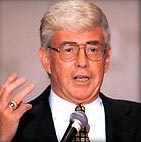|
|
Jewish World Review /Jan. 12, 1999 /23 Teves, 5759
Tony Snow
(JWR) --- (http://www.jewishworldreview.com) Jack Kemp cannot sit still. He fidgets as he speaks, jabbing
the air for emphasis.
Suddenly he stops, as if he had heard a distant baby's cry. "I'll be right
back," he says. "Five minutes."
On cue, his secretary opens the door, and he whooshes out.
For the first time in nearly years, Jack Kemp gets to call his own plays
his own way. If he needs an assistant, he bangs on the wall. If he wants his
secretary, he calls out.
But the most revealing part of Kemp's work space, and the most personal,
are his bookshelves. His heroes rest there among five bronze likenesses of
Abraham Lincoln, one of Churchill and one of Ronald Reagan.
One also sees the marks of a restless mind. His shelves look like Liberal
Arts Heaven: They are lined with tomes on economics, history, literature and
politics. There's even an untouched copy of W.E.B. Du Bois' "Souls of Black
Folk."
In one nook lurks the biggest surprise of all. A 30th anniversary poster
for the Buffalo Bills football team features six heroes: Thurman Thomas, Ed
Rutkowski, Jim Kelly, James Lofton, Jack Kemp and -- O.J. Simpson.
As you look at the picture, an epiphany thunders home. This guy has lived
his entire adult life beneath a spotlight.
The clock ticks. An hour passes.
Kemp materializes: "I'm sorry, man," he pants. "That was a bunch of cops
from D.C. They wanted to go on strike! They were going to play right into
the city's hands! Let's talk tomorrow!"
The next day, he explains. He was performing his Brother Teresa routine (my
description, not his) for district cops, spreading oil across the roiling
waters.
Then, he describes his grander plan to transform the nation's capital from
a crime-riddled joke into a conservative urban fantasy land: a flat tax of
18 percent, radical deregulation of city services, privatized public
housing, educational vouchers and an end to rent control.
"Did you know that the first thing they did in Hanoi after the war was to
lift rent controls? The finance minister said rent controls did more damage
to the buildings in the city than our bombs did."
Within the next three sentences, he apostrophizes four other presidents,
picks up a head of steam and begins rattling off mini-speeches: "We need to
make growth & jobs & opportunity & entrepreneurship & equal opportunity an
integral part of our policies & speeches & activities." (Pause to breathe.)
"Whoever said we have to cut spending first was wrong. That's a myth. The
tax system itself is a barrier to growth in the economy. We should cut taxes
because we want to lift that burden. Because it's the right and decent thing
to do."
Americans need hope, he says. Republicans must go about "doubling the size
of the American economy -- maybe not by 2002 -- bringing the nation to full
employment and increasing employment in urban areas and among low-income
people. I would couple it with educational choice, privatizing public
housing and giving poor people access to capital.
"I look upon this kind of thing as the true form of affirmative action."
He ties off the sermon with a favorite aphorism: "People don't care what
you know until they know you care."
For the neurons and synapses in Jack Kemp's brain, every hour is rush hour.
Ideas and enthusiasms wait impatiently for their chance to burst out.
This rabid curiosity has its shortcomings. Kemp lost his bid for the
presidency in 1988 because he acted as if he were auditioning for a
professorship rather than for the top office in the land. But nowadays, Jack
Kemp has focus and fire. It's first and goal in the GOP revolution, time to
think about missions and goals and causes.
Thinking about it all, Kemp smiles. "I guess I'm the senior statesman of the Republican Party."
But before we can explore that idea, his secretary intervenes again.
"Sorry," he says. "Gotta go. There's another strike I want to help
 Jumpiní Jack (Kemp)
Jumpiní Jack (Kemp)
His office reflects his happy chaos. A half-unpacked suitcase sits askew
between the armrests of a chair. Footballs litter the room. Family pictures
share shelves with memorabilia.

Kemp

01/08/99 : Hot air in the Windy City